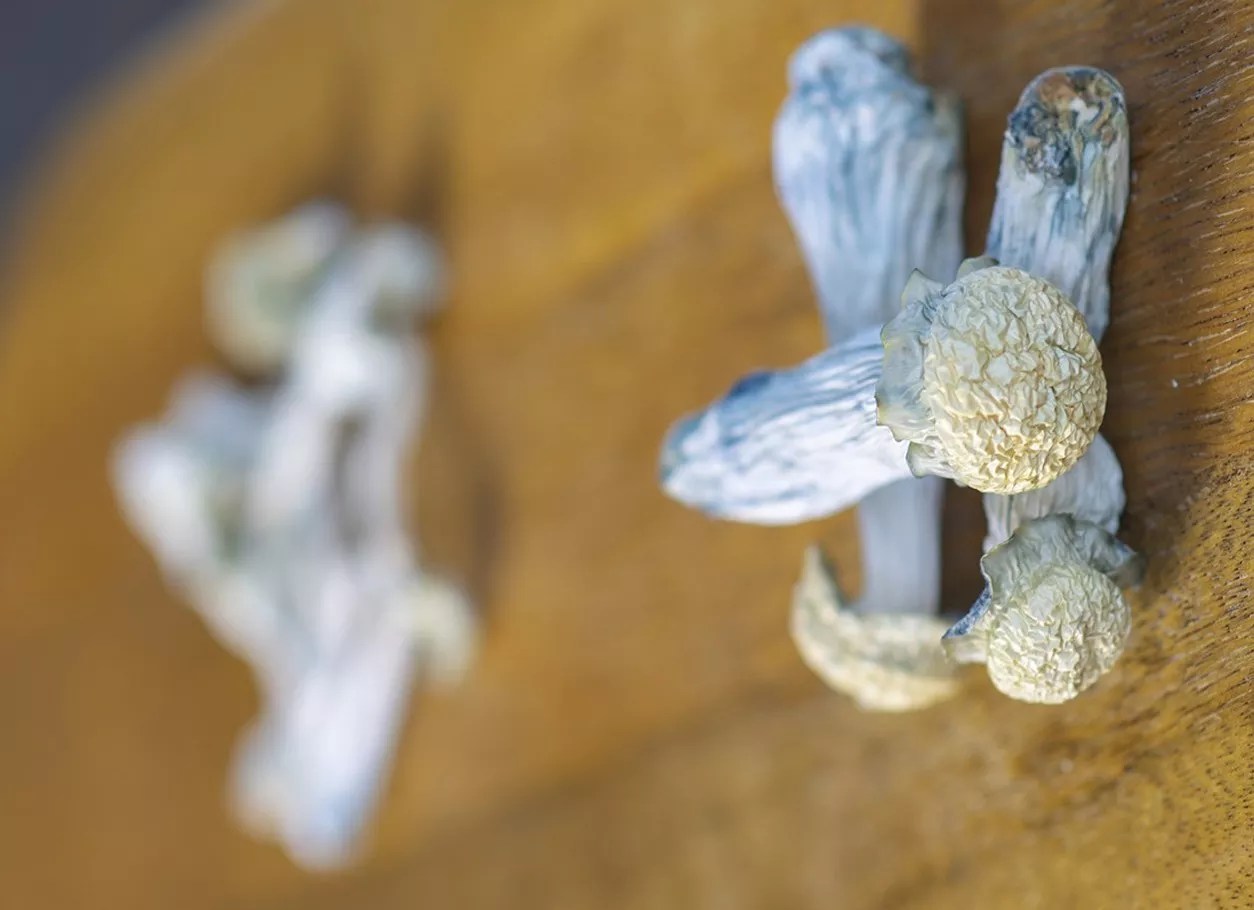
Evan Semón

Audio By Carbonatix
The State Fair ended on Labor Day, but there’s still time to see who grows the biggest and best magic mushrooms in Colorado.
Less than a year after Coloradans voted in favor of the decriminalization of psilocybin, DMT, ibogaine and mescaline, the first-ever Psychedelic Cup will measure homegrown magic mushrooms in categories such as highest psilocybin content and most overall potency. There will also be a beauty contest for the most vibrantly grown boomers at the event, set for Thursday, November 2, at Mile High Station.
Organized by the Psychedelic Club of Denver, a nonprofit educational group, the Psychedelic Cup has been in the works since the passage of Proposition 122, or the Natural Medicine Health Act, according to coordinator Jonathan Cherkoss. However, things really started to come together once Colorado lawmakers approved Senate Bill 23-290.
“That really opened the door, because it legalized testing labs, and now the labs can take a product and give you the potency analysis,” Cherkoss explains. “We have over 115 growers signed up at this point. I don’t think it would have been as successful without the actual legal protection we have. I still think we would have thrown a great event, but not as many people would be involved.”
Drafted to create a framework for the Natural Medicine Health Act, SB 290 sets up personal cultivation and possession parameters for natural psychedelic substances and allows certified labs to test homegrown mushrooms. Psilocybin, soon to be legal for supervised therapeutic use, is the most popular and researched of the four decriminalized substances in Colorado.
The Psychedelic Club of Denver hopes to take advantage of all the attention focused on the new laws to educate people about the responsible use and cultivation of mushrooms, according to Cherkoss. Public display laws will be followed during the beauty contest, no psychedelics will be for sale or consumed at the awards show, and any entrant or attendee must be at least 21.
“One of the main issues we wanted to watch out for while putting this together was harm reduction. This is really focused on getting people to learn about the potency of their mushrooms and having conversations about what that means, whether it’s dosages or things like that,” he says. “We wanted to avoid having this be a straight potency mushroom contest, because, frankly, there are some very potent mushrooms, and not everyone wants those. That might not be the best method you’re using them for, whether it’s for Indigenous or spiritual purposes or mental health.”
Competitors will submit their samples to Englewood cannabis and psychedelics testing lab Altitude Consulting, which analyzes mushrooms with a seven-panel liquid chromatography test that covers everything from aeruginascin to psilocybin to something called 4-hydroxy-TMT (iodide). Then at the Psychedelic Cup, set for six days before the one-year anniversary of Prop 122’s passage, the Psychedelic Club of Denver will announce winners of six fungi categories: highest psilocybin content, highest psilocin content, lowest detectable psilocybin content, highest overall alkaloid content, highest psilocybin content on average, and highest overall potency.
Psilocybin gets all of the headlines, but there are more magical compounds in magic mushrooms. Psilocin is converted into psilocybin in the digestive tract, largely enhancing psychedelic effects, while certain alkaloids could impact how we experience a specific mushroom’s psychedelic effects, similar to the way terpenes are thought to impact a cannabis strain’s high.
Magic mushroom growing contests have been held underground or in gray areas for years, Cherkoss says, but Colorado’s laws and testing capabilities enable the Psychedelic Club of Denver to hold its competitions on a scale bigger than anything he’s seen before. And after this first contest is over, the club plans to share data collected from the lab in hopes of breaking new ground in mycology or the potential entourage effects in mushrooms.
“That’s what we’re hoping to find out: how all of these things interact. We’re in a state of figuring out what they all do, and we’re definitely in the early days of learning about what they mean for the consumer,” he adds. “Whether or not you want a strain with a lot of baeocystin, or if that makes you anxious – we don’t know all of that yet. Colorado has an opportunity to do all of this from the ground up. Cannabis sort of developed over time. I think there will be a faster learning curve with this.”
Altitude Consulting will only take whole mushrooms, not just caps; it will not accept ground material with the mushrooms, either, as that can be altered to increase potency tests. Genetic testing and specific categories for entry should further protect the competition from any foul play, according to Cherkoss.
“The biggest thing there is that this is an education and community event. Cheating is pretty lame. You’ll get a medal and cool stuff for winning, but we’re not giving out cash prizes or anything like that,” he says. “I don’t think the end results would be a surprise for mycologists, but for someone who has been in it for a year or so, like me, it could be pretty amazing.”
The Psychedelic Cup is accepting mushroom entries through October 17. The $35 entry fee includes admission to the awards ceremony on Thursday, November 2, at Mile High Station, 2027 West Colfax Avenue. General admission passes to the ceremony (21+) are also available for $35. Learn more and sign up at copsychedeliccup.com.